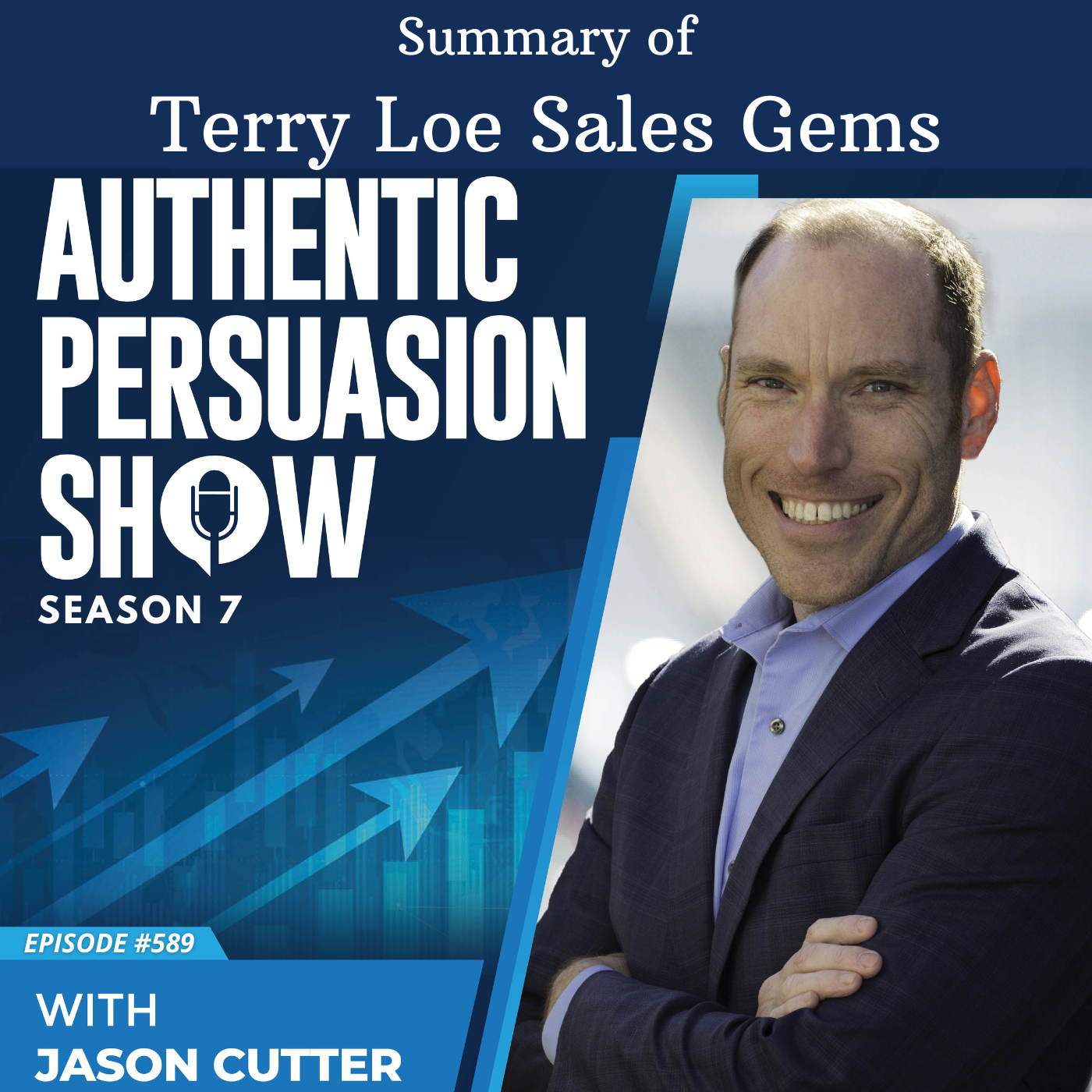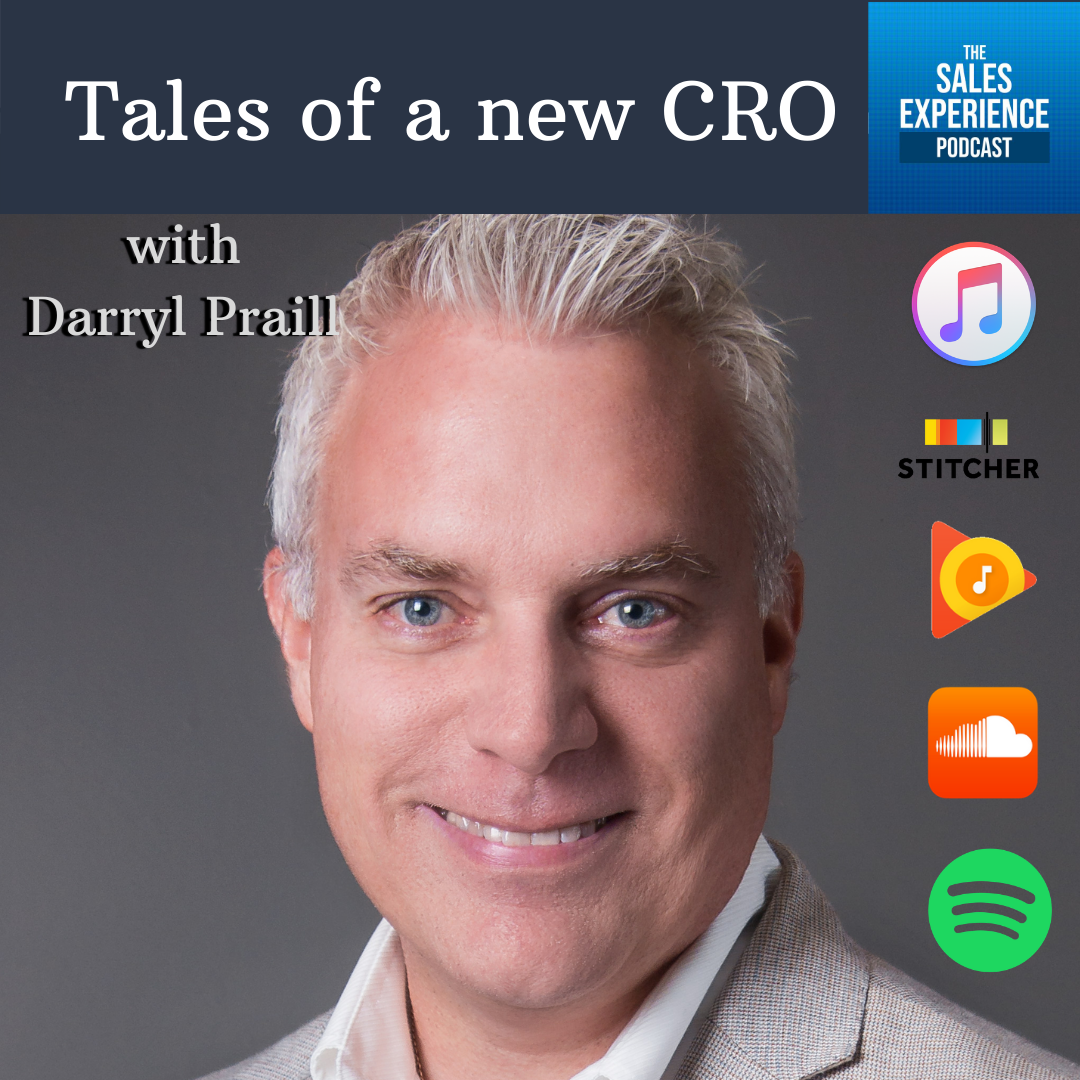Show Notes
This is the third segment of the conversation I had with Bill.
In Part 3, Bill and I talk about:
- Managers: Do you know what motives each on your sales reps?
- Coaching success by asking questions (which is also how you win as a sales professional!)
- Do you really want to be held accountable?
Download The Power of Authentic Persuasion ebook
Enroll in the Authentic Persuasion Online Course
Connect with Jason on LinkedIn
Connect with Bill on LinkedIn
Bill’s Bio:
William Eckstrom is the President and founder of the EcSell Institute. Bill has spent his entire career in the sales arena; the first 14 years in personal production and then 13 in various sales leadership roles. His management career began in 2000 as a District Manager for a medical equipment company and was promoted to U.S. Director of Sales in 2003. In 2004, Bill was lured away to become Senior Vice President of Business Development for a publicly-traded healthcare organization. In 2008, he founded the EcSell Institute to fill a void he witnessed and personally experienced in the sales leadership profession.
Bill presented a TEDx Talk to an audience of over 1,700 at the University of Nevada, Reno where he shared life-altering, personal and professional development ideas through the introduction of the “Growth Rings.” Since the release of the Talk, it received 100,00 views in just one week and now has over 3,000,000 views.
Most recently Bill helped co-author The Coaching Effect: What great leaders do to increase sales, enhance performance, and sustain growth which became an Amazon-Best Selling book in it’s first week of launching.
As a result of his experiences, his company’s findings, and his public speaking skills, Bill’s work as a keynote speaker is highly regarded throughout North America. While his audiences call him “profoundly authentic”, “highly entertaining” and much more, Bill is most proud of the fact his material is based on EcSell’s science and research—he does not present motivational fluff. He has presented to hundreds of groups ranging in size from 25-2,500 on topics found on his personal website, billeckstrom.com.
Lincoln, Nebraska is home for Bill and his wife. Together they have three children, Will Jr, Claire and Maddie. Philanthropically, Bill prefers a very hands-on approach as evidenced by his current involvement and passion–working and training their Yellow Labrador, Aspen, for therapy dog work. Soon he and his four-legged companion will be visiting children in hospitals and senior citizens in nursing home settings. Bill also has a strong need to be in the outdoors and finds time each year to spend in field and stream with his children and close friends.
Bill’s Links:
EcSell’s website: https://www.ecsellinstitute.com/
Bill’s bio: https://www.ecsellinstitute.com/bill-eckstrom
E185 – Transcript
Jason: Welcome back to the sales experience podcast. Welcome back to part 3 of my conversation with Bill Eckstrom. My name is Jason Cutter. So glad that you’re here. I appreciate the fact that if you’re listening to this, if you’re in a leadership role in a sales organization that hopefully your goal is to shift yourself into coaching and into measurable coaching, not just coaching and leading and knowing how to do it and what you should do and how you should talk to your salespeople or how you should coach them or help them, but doing it in a measurable way in which there’s tracked results and you know the effort that’s being put in and then the results coming out in the same way. And what’s interesting is exactly how you expect salespeople to operate and have their numbers and know what those conversions are as they go through the process, which we talked about in part 1 is the same way as a coach, a leader, a manager, an executive should be tracked with the effort and then the results and then tweaking things as you go. So here it is part 3 and enjoy.
Jason: If you recognize them in a meeting and you have a team meeting and you say, Hey, Jim did a great job, Jim will actually stop doing well because Jim doesn’t like public acknowledgement and doesn’t do it for that and will actually stop selling because he doesn’t want to be called out again. Even if it was a positive thing. And then Carol, if you don’t call out Carol, Carol will stop selling because all she wants is gold stars and accolades and the money’s great, but what she wants is that acknowledgement and none of it’s right or wrong. It’s just you have to be able to coach all of them.
Bill: Yeah, and the beautiful part in what you said is so spot on, Jason. The best part about that now is organizations can actually measure and quantify if using that as an example, whether or not that’s occurring, whether or not they are acknowledging and whether the sales people feel like they’re unique, whether or not they are treating people uniquely in helping that person move towards a career objectives and helping them, you know, what’s different aspects of their skill development that are just simply unique to that person. And organizations shouldn’t be guessing this stuff because it is so important to performance. They need to quantify that just like they’re quantifying how much salespeople sell.
Jason: So let’s talk about that because this is always the hard part. You’ve mentioned it several times where you know, the sales manager should be doing these things, could be doing these things. Nobody has any idea of what’s actually being done and everyone’s flying blind. So how do you actually measure that? Like how do you actually get that down?
Bill: Good question. There’s a couple of different ways. First when we talk about measurement, and I mentioned that before, and the only way to understand the coaching dynamic between a coach and a salesperson, when you use sales as the example here, the only way to understand that is to survey the sales people. And I’m not talking about 360 I’m not talking about which I’m not a huge fan of. Anyway, I’m talking about bottom up measurements. And sometimes when I say that people go, Oh, well I’m sure that’s, you know, the most accurate, you know, maybe you should be a boss or a peer looking, you know, what, how much time, you know, when I’m in a sales leadership role, I don’t see my boss tagging me around to see, Oh well I’m coaching, right? None of my peers at the company hanging with me to see, while I’m coaching. The only people that are good enough measurement of that are the people on my team. And quite frankly, those are the ones that matter most, right. And I liken it to the easy way to look at it is to say if you were trying to measure customer service, the service you’re providing your customers, would you ask your customer service people how well are they providing the service or would you go to your customers?
Jason: Of course.
Bill: Right, so that’s the number one and by surveying salespeople we are, and asking them the right questions. We can really understand the coaching dynamic that takes place between sales coach and salesperson. So that’s number 1. And the other way to quantify is really to understand the activities the amount of activities are doing. So if you understand the outcome, and that is the only way to measure an output of coaching is to what we call the coaching effect survey. And again, I’m not trying to be self-promotional. That’s what we call ours coaching effect survey. That is the outcome, okay? That’s through the eyes of the salespeople, how they believe that dynamic occurs between their manager and themselves. The input of that though is what is a coach doing on the front end? Are they doing their one-to-one meetings? Are they writing with me in the field?
Bill: Are they hopping on a phone call with the salesperson and a prospect or a client? Are they holding team meetings? So all those are coaching inputs. And if we can quantify that and the way we do it is we have a coaching Cod that we have our clients use. And if they’re going to do a one on one meeting instead of keeping notes in a word document, keep them in the cloud. And if you’re going to go do a ride along or you’re going to join a salesperson on a sales call and you’re going to give them feedback, we’ll make sure you document the feedback and everything goes in a singular system. And when that happens, you have vast amounts of data that you can now marry with survey results and you get coaching inputs and coaching outcomes and it’s really, you know, you can correlate those things together to determine what creates the most discretionary effort.
Jason: And what I’ve seen, and this is kind of for the managers for the, more for the owners out there who might be listening to this, is that one of the things that occur in what you’re talking about with those systems, cause I’ve rolled that out myself as well, is either direct and outward resistance from sales manager coaches to not wanting to do it all the way to the other end of the spectrum of you know, not doing it but like passively forgetting, ignoring it, you know, Oh I did the one-on-one. I just didn’t document it because they don’t want to be held accountable. And I think the real key and what I’ve found, which you’ve talked about as well, is marrying it with the why. So why sales manager coach, it’s so important. We’re going to have this new system, we’re going to track you and not to track you so we can hold you accountable and we can punish you.
Jason: Like in the same way that some sales reps get defensive when you want to start going through their numbers, right? The winners want to be held accountable and they want to know how did they win? The people who are struggling, I don’t want to say the losers, but the ones who have that mindset where they don’t necessarily want to perform at that level because they know it requires accountability, feedback and being honest about it that they are going to shy away from it. I mean you’ve got to set that why as a company and then you’ll notice if your manager is a good fit or not. If they want to win, if they’re going to jump on board, you know over the right amount of time with your new system.
Bill: Exactly. Forget our system. You brought up a great point. Just think philosophically, is your organization one of excellent and if it’s one of excellence, do you need data to help you with that? And the answers are always, you know, everybody always says, yeah, we’re a company of excellence or yeah, we’re a data driven company. If that’s the case, you know, here’s the example use. Do you know a professional golfer that doesn’t track their ways hit, you know, sand saves putts per green, right? They have all their data and all their metrics and golfers are looking at them constantly. Every tennis player on the tour knows first serve percentage, second serve percentage, return points 1 every data point. Because with those data points, I can grow. But yet when we get to leadership roles, they have a tendency to shy away and say, Oh, I don’t know if I want to know that stuff. Here’s what’s so interesting and probably where we should focus as much of our time is on this. 30% of them though, Jason want to know the top 20% we see our heads and tails better than the bottom 80 we see about 30% of people that really want to know that information and they look at this type of information and they say, I’m going to do that because I see a way to improve my skills in my role.
Jason: Yeah. And, and I think it’s really just comes down to how people view themselves in their job and their role, whether it’s salespeople, managers, executives, you know, obviously it’s easy to say, well, you know, this professional athlete, this professional golfer or tennis person, you know, basketball player, they’re professional. That’s what they do. They get paid lots of money. But you know, anybody in any role could also act like that professional, that pro who’s gonna put in the effort and wants to know and wants to improve and tracks all of their numbers and knows their numbers, know there’s team’s numbers before the sake of, you know, that conversion. And really, and this is kind of my focus was lot of people is if you’re not operating in that way, and obviously superstardom isn’t for everybody, it takes a lot of work, 10,000 hours. It’s a grind. There’s a lot of pain and blood and sweat and tears and all of that. You know, especially like you said, getting out of the comfort zone and into discomfort, right? No pain, no gain. Not everyone is built for that. But if you’re in a leadership role, you know, really want people who are in that mode and want to succeed at the level, you know, that they could and always want to grow relative to them.
Bill: Yeah, Jason, you’re right. And I use those examples like professional golfers or professional tennis players, but the reality is what we’re talking about is growth. It’s that simple. I don’t have to be the top sales person and I have to be in the top 5% I don’t. If I want to grow, I need to know how to grow. And that’s really what it is. It’s all about growth and having information that allows me to get better in the areas that matter most. So I would tell you whether I am a professional golfer or whether I am a frontline sales leader, if I don’t want to grow the culture that should be on the team is like, you know, that is not acceptable. Culturally. No organization should say, Hey, we’re okay with our people not growing. I mean, what if you’re a salesperson? You know, if you have, you’re working with the organization and some of the sales people come up and say, Hey, you know what? That new methodology you’re showing us, man, Jason, I just don’t have time. I really don’t want to change my behaviors to grow this year. How long would they last in an organization?
Jason: Alright, that’s it for part 3. We’ll stop it here for today. If you haven’t, make sure to subscribe, you can get these episodes every single day when they come out. You can go to cutterconsultinggroup.com/podcast and find the episode, transcripts. Bill’s links, my links, all of my info. You can also find me on linked in, so I’m there a lot. If you want to talk about sales, if you want chat, if you need help with your organization, you want to talk about coaching and leadership or developing out your sales team or your sales leaders, please use my website cutterconsultinggroup.com reach out to me. You can email me, fill out the contact form. You can call me, you can text me or you can find me on LinkedIn. And as always, let me leave you like I love to do, which is keep in mind that everything in life is sales and people remember the experience you gave them.
![[E185] The Coaching Effect with Bill Eckstrom – Part 3 of 4](https://episodes.castos.com/salesexperiencepodcast/images/Bill-Eckstrom-Cover-Image.png)


